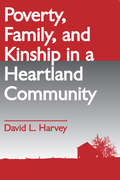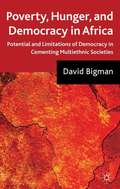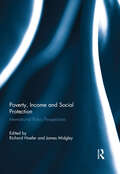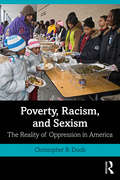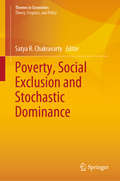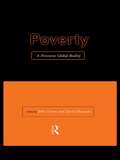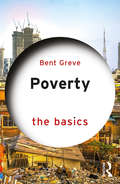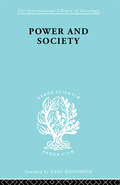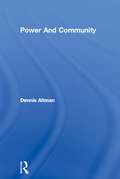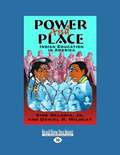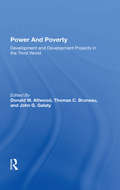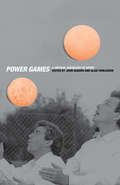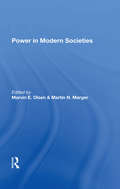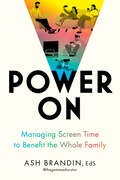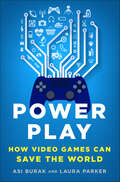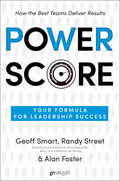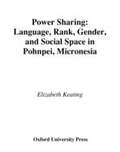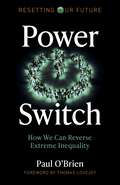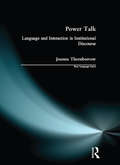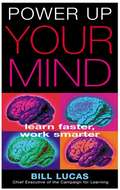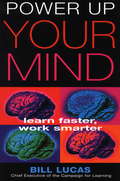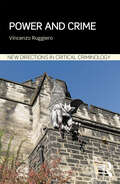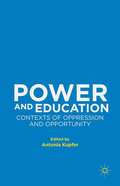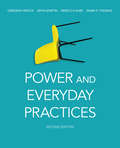- Table View
- List View
Poverty, Family, and Kinship in a Heartland Community: Poverty, Family, And Kinship In A Heartland Community
by David L. HarveyWith a few notable exceptions, sociological studies of poor, native-born, non-ethnic whites in rural areas are rare. This book corrects this oversight with an ethnographic study of a small, poor, white, heartland community that the author calls "Potter Addition." The community consists of some 100 families and is located on the rural-urban fringe of a medium-sized Midwestern city.Poverty, Family, and Kinship in a Heartland Community is the story of three generations of rural families who, one after another, have been driven from the land during the last seventy-five years. Harvey argues against the grain of a number of recent studies that "Potter Addition's" poverty, like much modern poverty, has its origins in the productive contradictions of late capitalism. It is not the result of some moral or motivational defect of the poor themselves. At the same time he shows, even as they struggle to survive their uncertain niche and learn how to adapt, these families play an active role in reproducing the everyday material and cultural details of their poverty from the substance of their daily experiences.Working from this premise, Harvey provides a detailed ethnographic description of "Potter Addition" and its people. The volume focuses especially on the family and kinship structures that have developed in "Potter Addition" and shows how they fit into the overall response of the poor to their uncertain and unpredictable class situation. This is a unique effort by a knowledgeable researcher who, in this work, boldly steps outside conventional realms of discourse in sociology and geography.
Poverty, Hunger, and Democracy in Africa
by David BigmanThe book evaluates alternative policy options for the African countries to overcome the food crisis and the changing structure of world trade to sustain their impressive growth of the early 2000s. These policies must go beyond economic reforms and seek a solution to the entrenched political problems that divided the continent.
Poverty, Income and Social Protection: International Policy Perspectives
by James Midgley Richard HoeferThis book provides insights into the way social protection policy is being redefined as a result of the new commitment by governments around the world to use these programs to reduce poverty. The case studies presented show how innovations in social protection have emerged in different countries. They also discuss various aspects of social protection that will be of interest to readers. While some of the case studies are primarily descriptive and seek to document recent trends in different countries, they also address important social policy issues. Others are particularly topical because they provide useful updates on recent social protection innovations. Countries discussed include Brazil, Britain, Chile, China, Indonesia, South Africa, and the United States. This book was originally published as a special issue of the Journal of Policy Practice.
Poverty, Racism, and Sexism: The Reality of Oppression in America
by Christopher B. DoobExploring the structural causes and consequences of inequalities based on a person’s race, class, and gender, Poverty, Racism and Sexism: The Reality of Oppression in America concentrates on this formidable set of disadvantages, demonstrating how Americans are adversely affected by just one or a combination of three social factors. Grounded in sociological thought, the text highlights unfolding stories about major social inequalities and relentless campaigns for people’s rights. Weaving together such concepts as individualism, social reproduction, social class, and intersectionality, the book provides a framework for readers to understand the vast injustices these groups encounter, where and why they originated, and why they continue to endure. Poverty, Racism and Sexism is a compact, versatile volume which will prove an invaluable resource for those studying social inequality, social problems, social stratification, contemporary American society, social change, urban sociology, and poverty and inequality.
Poverty, Social Exclusion and Stochastic Dominance (Themes in Economics)
by Satya R. ChakravartyThis book honors the memory of Tony Atkinson, who made significant contributions to the rigorous study of income inequality, poverty, and redistribution. These essays presented, covering a span of over 30 years of research and scholarship, have been at the forefront of distributional analysis, and many of them are of prime importance for contemporary developments in the real-valued measurement of poverty and inequality, with particular reference to the concepts of fuzzy poverty assessment, vulnerability, heterogeneity/multidimensionality, unit consistency, sub-group decomposability, and dominance criteria. While all of these articles have been previously published—singly or with co-authorship—in a number of professional journals or distinguished edited volumes, this book is greatly enriched by a substantial introductions by the authors, which place the contributions in context, highlights their inter-connectedness, and relates them to the work of Tony Atkinson and other scholars. This book is of intrinsic value to welfare analysts, as well as being a tribute to a very great scholar by a fellow economist.
Poverty: A Persistent Global Reality
by John Dixon Professor John Dixon David MacarovThis book addresses the long-standing global issue of poverty. An introductory chapter explores concepts and definitions of poverty, the subsequent chapters providing detailed examinations of poverty in ten different countries: UK, USA, Australia, Canada, Hong Kong, Ireland, Malta, The Netherlands, The Philippines and Zimbabwe. Each chapter follows a consistent format, to facilitate comparison and focuses on the following issues:- * the socio-economic and historical context within which poverty exists * the extent and nature of poverty its causes * the measures that have been taken to mitigate it. This book will be essential reading for students of social policy and administration as well as development studies and anthropology.
Poverty: The Basics (The Basics)
by Bent GrevePoverty has dire consequences on the ability to fulfil one’s aspirations for life. Poverty has strong implications for social cohesion and societies’ abilities to function in harmonious ways. This book presents the readers with the core concepts, latest development and knowledge about policies that work to eliminate absolute poverty. This volume shows what the consequences are for the quality of life of those living in poverty. It describes life for people in poverty in general, but also deals more specifically with children, in-work poverty and the elderly, thus providing a life, generational and global perspective on poverty, including the impact on people’s happiness levels. The book also discusses policies aimed at poverty reduction, such as changes to the labour market – including the risk of working poor – and shows that there is a variety of possible instruments available to reduce poverty. These range from direct provision of social security to ensuring education and a better functioning labour market. Written in an engaging and accessible style, the book provides a succinct insight into the concept of poverty, how to measure it, the situation of poverty around the globe as well as different types of possible interventions to cope with poverty. Supporting theory with examples and case studies from a variety of contexts, suggestions for further reading, and a detailed glossary, this text is an essential read for anyone approaching the study of poverty for the first time.
Power & Society Ils 50: A Framework For Political Inquiry (International Library of Sociology #No. 2)
by Harold D. Lasswell Abraham KaplanFirst published in 1998. Routledge is an imprint of Taylor & Francis, an informa company.
Power And Community: Organizational And Cultural Responses To Aids
by Dennis AltmanThis book provides a global overview of the role of the community sector, examining in detail the origins and activities of community organizations in Europe, the Americas, Africa, South Asia, Southeast Asia, Australia and the Pacific. It also describes the impact of sexuality and gender on AIDS activism and AIDS organizing, as well as broader cultural responses to the epidemic. It charts the emergence and development of the community sector response to HIV and AIDS, illustrating the factors that led affected individuals and communities to organize, question, challenge and redefine initial governmental responses to the epidemic. It describes the contribution of the community / NGO sector to global efforts to prevent the spread of the disease, highlighting tensions which have sometimes arisen within community based organizations themselves: tensions between activism and service provision, between altruism and self help, between volunteer participation and management control, and between fluidity of function and increasing bureaucratization. "Power and Community" has grown out of the author's intellectual and political commitment to the idea that without support from strong community based responses, public health systems will fail to deal with the crisis of AIDS. Dennis Altman analyzes the practical dilemmas which have confronted community based organizations around the world, and the political significance of their ability to motivate and mobilize affected communities. The result is a book which should be a valuable resource for researchers, community organizations, policy makers and activists alike.
Power And Place: Indian Education In America
by Vine Deloria Daniel WildcatPower and Place examines the issues facing Native American students as they progress through the schools, colleges, and on into professions. This collection of sixteen essays is at once philosophic, practical, and visionary.
Power And Poverty: Development And Development Projects In The Third World
by John G Galaty Donald W. Attwood D W Attwood Thomas C BruneauThis book presents case studies concerning the impact of development projects on societies at various levels of affluence and modernization. They demonstrate project variety, and the ecological, economic, political and social contexts within which development is attempted but seldom achieved.
Power Games: A Critical Sociology of Sport
by Alan Tomlinson John SugdenCritical and radical perspectives have been central to the emergence of the sociology of sport as a discipline in its own right. This ground-breaking new book is the first to offer a comprehensive theory and method for a critical sociology of sport. It argues that class, political economy, hegemony and other concepts central to the radical tradition are essential for framing, understanding and changing social and political relations within sport and between sport and society.The book draws upon the disciplines of politics, sociology, history and philosophy to provide a critical analysis of power relations throughout the world of sport, while offering important new case studies from such diverse sporting contexts as the Olympics, world football, boxing, cricket, tennis and windsurfing. In the process, it addresses key topics such as:* nations and nationalism* globalisation* race* gender* political economy.Power Games can be used as a complete introduction to the study of sport and society. And will be essential reading for any serious student of sport. At the same time, it is a provocative book that by argument and example challenges those who research and write about sport to make their work relevant to social and political reform.
Power In Modern Societies
by Marvin E. Olsen Martin N Marger Valencia FonsecaAn extensively revised and updated new edition of Olsen’s Power in Societies, this book contains carefully selected and edited writings on the exercise of social power in contemporary societies. The essays cover four broad topics: power in social organization, theoretical perspectives on power, national power structures, and power and the state. Ea
Power On: Managing Screen Time to Benefit the Whole Family
by Ash BrandinFrom "The Gamer Educator", an openminded guide to parenting alongside screens and gaming, offering practical solutions to managing your family's screen time. Parents are feeling mounting pressure to minimize screen time, but are struggling to do so in our technologically driven world. In contrast to the fear and pressure parents are facing, Ash Brandin's Power On offers a calm and reassuring message that keeps the wellbeing of the whole family in mind. Power On powerfully reframes our current dialogue around technology, beginning with the morality placed on screen time and leisure, and the systemic factors contributing to it. Brandin replaces fear with empowerment, giving caregivers tools and strategies for safely incorporating tech into their children's lives, guiding children to having a healthy relationship with screens, with easy to implement approaches such as: ·The ABCs of the Screentime Management Elements – Access, Behavior, Content ·The Managing Online Safety S.T.A.R. – Settings, Time, Ads/App Store, Restriction ·The N.I.C.E. Screentime Boundaries – Needs, Input, Consistent, Enforceable ·And several other sets of steps, tools, and strategies to understand, manage, and effectively utilize tech in parenting. With today's parenting advice being awash with unhelpful negative judgements on screens and little realistic actionable advice, Ash Brandin provides timely, realistic direction that will empower readers to find a balance with screen time that works for the entire family.
Power Play: How Video Games Can Save the World
by Laura Parker Asi Burak“An insider’s view of the good things that can emerge from being glued to a screen. . . . A solid piece of pop-culture/business journalism.” —Kirkus ReviewsThe phenomenal growth of gaming has inspired plenty of hand-wringing since its inception—from the press, politicians, parents, and everyone else concerned with its effect on our brains, bodies, and hearts. But what if games could be good, not only for individuals but for the world? In Power Play, Asi Burak and Laura Parker explore how video games are now pioneering innovative social change around the world.As the former executive director and now chairman of Games for Change, Asi Burak has spent the last ten years supporting and promoting the use of video games for social good, in collaboration with leading organizations like the White House, NASA, World Bank, and The United Nations. The games for change movement has introduced millions of players to meaningful experiences around everything from the Israeli-Palestinian conflict to the US Constitution.Power Play looks to the future of games as a global movement. Asi Burak and Laura Parker profile the luminaries behind some of the movement’s most iconic games, including former Supreme Court judge Sandra Day O’Connor and Pulitzer Prize–winning authors Nicholas Kristof and Sheryl WuDunn. They also explore the promise of virtual reality to address social and political issues with unprecedented immersion, and see what the next generation of game makers have in store for the future.
Power Score
by Geoff Smart Randy Street Alan FosterghSMART, the bestselling team behind Who: The A Method for Hiring, returns with a breakthrough formula for how the best leaders and teams deliver results. "ghSMART is the world's top firm for helping leaders hire talented teams and run them at full power. Nothing is more important."--Marshall Goldsmith, bestselling author of Mojo and What Got You Here Won't Get You There "The most useful book about leadership." That is what we hope you and your team will say after finishing Power Score. Is your team running at full power? Only 10 percent of leaders run their teams at full power. The formula you are about to learn is based on the most extensive research of its kind, spanning more than 15,000 careers with over 9 million data points. The idea has been battle-tested for more than two decades by leaders in every major industry. It works. Successful leadership starts with three key questions: 1. Priorities--Do we have the right priorities? (Only 24 percent of leaders do.) 2. Who--Do we have the right people on the team? (Only 14 percent of leaders do.) 3. Relationships--Do we have the right relationships that deliver results? (Only 47 percent of leaders do.) Learn how to calculate your team's Power Score, and how to improve each of the three key areas of leadership. Learn what to do, and what not do, from compelling statistics and inspiring stories of those leaders who have succeeded and those who have failed. You may be surprised how easy it is to read this little book. And you may be even more surprised by how fast this approach will boost your team's results. When you dial up your team's Power Score, you will make a greater impact as a leader, help your team earn more money for your cause (whatever your cause may be), and enjoy greater career success.Advance praise for Power Score "The power score is the secret sauce that gives the group the information needed to fix problems. The authors provide plenty of guidance presented in an accessible Q&A format."--Success"I wouldn't be surprised if Power Score became the new go-to guide for leadership. Effective teams are key in everything from healthcare to business to government to nonprofits, and this book will help organizations change the conversation about getting results."--Atul Gawande, New York Times bestselling author of Being Mortal and The Checklist Manifesto "Smart, Street, and Foster have turned more than twenty years of research on leadership into a practical, systematic approach for getting results."--Frederick W. Smith, chairman and chief executive officer of FedEx Corporation "My entire team applied the principles of Power Score and has enjoyed explosive growth as a result. Even better, I am having more fun as a leader than ever before."--Jeff Booth, chief executive officer and founder of BuildDirect "The ghSMART team has done it again. With Who, they demystified the process of hiring A Players. Now they have decoded how to become an A+ leader."--Panos Anastassiadis, managing partner of Global CyberFrom the Hardcover edition.
Power Sharing: Language, Rank, Gender and Social Space in Pohnpei, Micronesia
by Elizabeth KeatingLinguistic anthropologist Elizabeth Keating went to the island of Pohnpei, in Micronesia, and studied how people use language and other semiotic codes to reproduce and manipulate status differences.
Power Switch: How We Can Reverse Extreme Inequality (Resetting Our Future)
by Paul O'Brien"The bad news is that the world is in crisis; the good news is that transformative activism can overcome it. Will the more formal progressive institutions have the courage to go all in with that activism?" Ben Phillips, author of How to Fight InequalityIs it actually possible? …that we might emerge from this pandemic with a peaceful global power switch from those who have too much to those who don't have enough? With billionaires able to decide the fate of nations, private corporations more powerful and less accountable than ever, and political autocrats around the world shaking our confidence in democratic institutions, power resides in all the wrong places. And so our world is in crisis. In such moments, activists find opportunities. Not to restore the pre-crises order, but to transform it. Paul O'Brien argues that progressive activists may never have a better opportunity to rewrite economic rules, systems and outcomes in favor of those who don't have enough. His book offers practical action steps for activists who want to drive a power switch that overcomes extreme inequalities in our world.
Power Talk: Language and Interaction in Institutional Discourse (Real Language Series)
by Joanna ThornborrowThe concept of social power, who holds it and how they use it is a widely debated subject particularly in the field of discourse analysis, and the wider arena of sociolinguistics. In her new book,Joanna Thornborrow challenges the received notion that power is necessarily held by some speakers and not by others. Through the detailed analysis of communication and interaction within a range of institutional settings, she examines power as an emerging, negotiated phenomenon between participants with different status and goals. Written in a clear style which combines attention to technical detail with accessibility, Power Talk includes: a comprehensive introduction to the theme of power including the analytic approaches to power in language a wide-ranging discussion of theory and practice and, in-depth contemporary case studies. Power Talk is the first book to focus on the topic of power in situated interaction across a range of contexts. As such, it makes a timely, and important contribution to the debate surrounding social power and language use, and will be of value to both students and researchers alike.
Power Up Your Mind: Learn Faster, Work Smarter
by Bill LucasBill Lucas, a leading international expert on life-long learning, shows that while we have learned more about how the brain works in the last decade than we have ever known, only a fraction of this is grasped and applied by most people. Power Up Your Mind applies this practical knowledge for the first time and shows you how to learn. Drawing on research from a wide variety of subject areas, from neuroscience to psychology, from motivation theory to accelerated learning, from memory to diet, this book shows how everyone has the capacity to succeed and how most people use only a very small portion of their talents. For learning to be effective, an understanding of how the brain works is essential and unlike most of the recent thinking on the mind, Lucas connects an understanding of the brain with the reality of the workplace and translates what we know about the brain into useful insights for work. Much work-based training is a waste of time and money because the majority of people are neither emotionally ready nor practically inclined to apply their learning to the way they behave. Power Up Your Mind offers a new model of learning-READY, GO, STEADY-which will revolutionize the way you learn and perform.
Power Up Your Mind: Learn Faster, Work Smarter
by Bill LucasBill Lucas, a leading international expert on life-long learning, shows that while we have learned more about how the brain works in the last decade than we have ever known, only a fraction of this is grasped and applied by most people. Power Up Your Mind applies this practical knowledge for the first time and shows you how to learn. Drawing on research from a wide variety of subject areas, from neuroscience to psychology, from motivation theory to accelerated learning, from memory to diet, this book shows how everyone has the capacity to succeed and how most people use only a very small portion of their talents. For learning to be effective, an understanding of how the brain works is essential and unlike most of the recent thinking on the mind, Lucas connects an understanding of the brain with the reality of the workplace and translates what we know about the brain into useful insights for work. Much work-based training is a waste of time and money because the majority of people are neither emotionally ready nor practically inclined to apply their learning to the way they behave. Power Up Your Mind offers a new model of learning-READY, GO, STEADY-which will revolutionize the way you learn and perform.
Power and Crime (New Directions in Critical Criminology)
by Vincenzo RuggieroThis book provides an analysis of the two concepts of power and crime and posits that criminologists can learn more about these concepts by incorporating ideas from disciplines outside of criminology. Although arguably a 'rendezvous' discipline, Vincenzo Ruggiero argues that criminology can gain much insight from other fields such as the political sciences, ethics, social theory, critical legal studies, economic theory, and classical literature. In this book Ruggiero offers an authoritative synthesis of a range of intellectual conceptions of crime and power, drawing on the works and theories of classical, as well as contemporary thinkers, in the above fields of knowledge, arguing that criminology can ‘humbly’ renounce claims to intellectual independence and adopt notions and perspectives from other disciplines. The theories presented locate the crimes of the powerful in different disciplinary contexts and make the book essential reading for academics and students involved in the study of criminology, sociology, law, politics and philosophy.
Power and Education: Contexts of Oppression and Opportunity
by Antonia KupferEducation is a crucial influence early in life and is therefore inextricably linked with power. This book examines how education can limit opportunities and create social inequality as well as being an empowering force for good. Theoretical approaches on the relationship of power and education are discussed as are questions on power and knowledge.
Power and Everyday Practices, Second Edition
by Rebecca Raby Deborah Brock Aryn Martin Mark P. ThomasThis unique and innovative text provides undergraduate students with tools to think sociologically through the lens of everyday life. Normative social organization and taken-for-granted beliefs and actions are exposed as key mechanisms of power and social inequality in Western societies today. By "unpacking the centre" students are encouraged to turn their social worlds inside out and explore alternatives to the dominant social order. The second edition is divided into three parts. Part one teaches students how to use theory and methodology, which are blended seamlessly throughout the text. It shows how to position Michel Foucault and Karl Marx as companions to theorists such as Stuart Hall, while signalling the importance of non-Western and Indigenous knowledges, experiences, and rights. In part two, students explore—and challenge—normativity in relation to the body, gender and sexuality, race and ethnicity, class, aging, and citizenship. In part three, chapters critique everyday practices such as thinking scientifically, practising self-help, going shopping, managing money, buying coffee, talking about Indigeneity, and travelling as a tourist. Each chapter includes thought-provoking exercises, study questions, and key terms that link to the volume’s comprehensive glossary. Instructors are provided PowerPoint slides, a test bank, and a list of online resources that make the book adaptable to online and blended learning environments.
